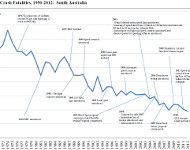12/27/2013
Australia: Report Questions Speed Camera MotivationEconomists measure road safety performance of South Australia and question whether public policy is geared more toward revenue generation.

The South Australian Centre for Economic Studies issued an issue paper last week questioning the motivation behind South Australia's speed camera policies. The think tank, part of the University of Adelaide, accepted the assumption that policies such as the use of automated ticketing machines and roadblocks have a beneficial effect, but the group questioned the way photo ticketing has been implemented in the state. In comparing South Australia to other Australian regions, the researchers found a the same downward trend in fatality rate from the 1970s to the present.
"What this suggests, for the nation as a whole, is that the principal contributing factors to the trend decline are equally applicable across the states and that they are the result of, inter alia, improved safety features and embodied technology in the automobile, all states introduction of random alcohol and drug testing and improvements in the quality of roads such as road shoulder sealing, the national black spots program, passing lanes on major highways and road safety campaigns," the report explained.
What is not the same across states is the level of fines, speed limits and tolerance levels. South Australia, for example, imposes a $1500 fine for driving with expired insurance, while the same offense in Tasmania merits a $200 fine. Driving 12 MPH over the limit is a $670 fine in South Australia and a $330 ticket in Western Australia. Road fatality rates between the two states is essentially the same. Half of all tickets in both states are issued to drivers accused of traveling less than 5 MPH over the limit. The low threshold for issuing tickets has proved controversial.
"These and other reasons have cemented in the minds of the general public that particularly mobile speed and fixed cameras are employed as revenue raising devices for the government," the report stated.
In 2001, there were only 8,564 citations issued in South Australia for driving 5 MPH or less over the speed limit. The number exploded to 159,747 in 2008, the first full year after officials lowered the secret trigger speed that sets off the speed camera.
"Road fatalities and serious injury are a complex 'policy problem' for government -- we do not dispute that -- but the reliance on heavy financial penalties in South Australia indicates an overly strong preference for revenue raising in the pursuit of greater road safety," the report found.
The researchers recommended that warnings be given for all first offenses at low speeds and that the government be forthcoming about trigger speeds. They also suggested South Australia not charge motorists $22 to find out how many tickets they have accumulated from photo tickets.
A copy of the issue paper is available in a 420k PDF file at the source link below.


